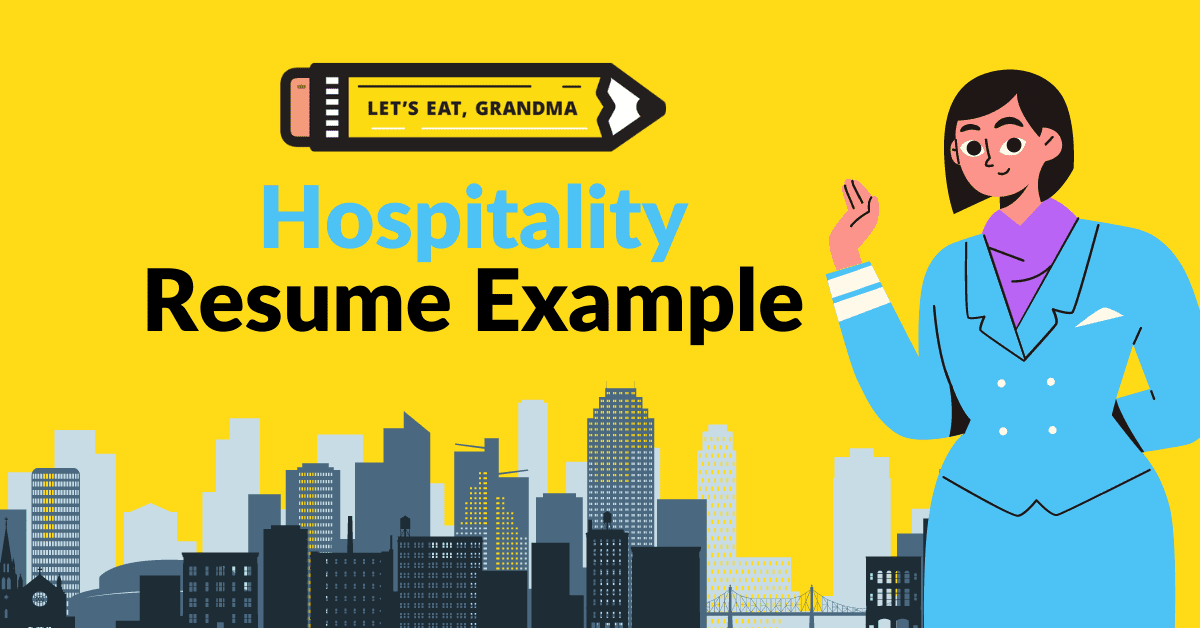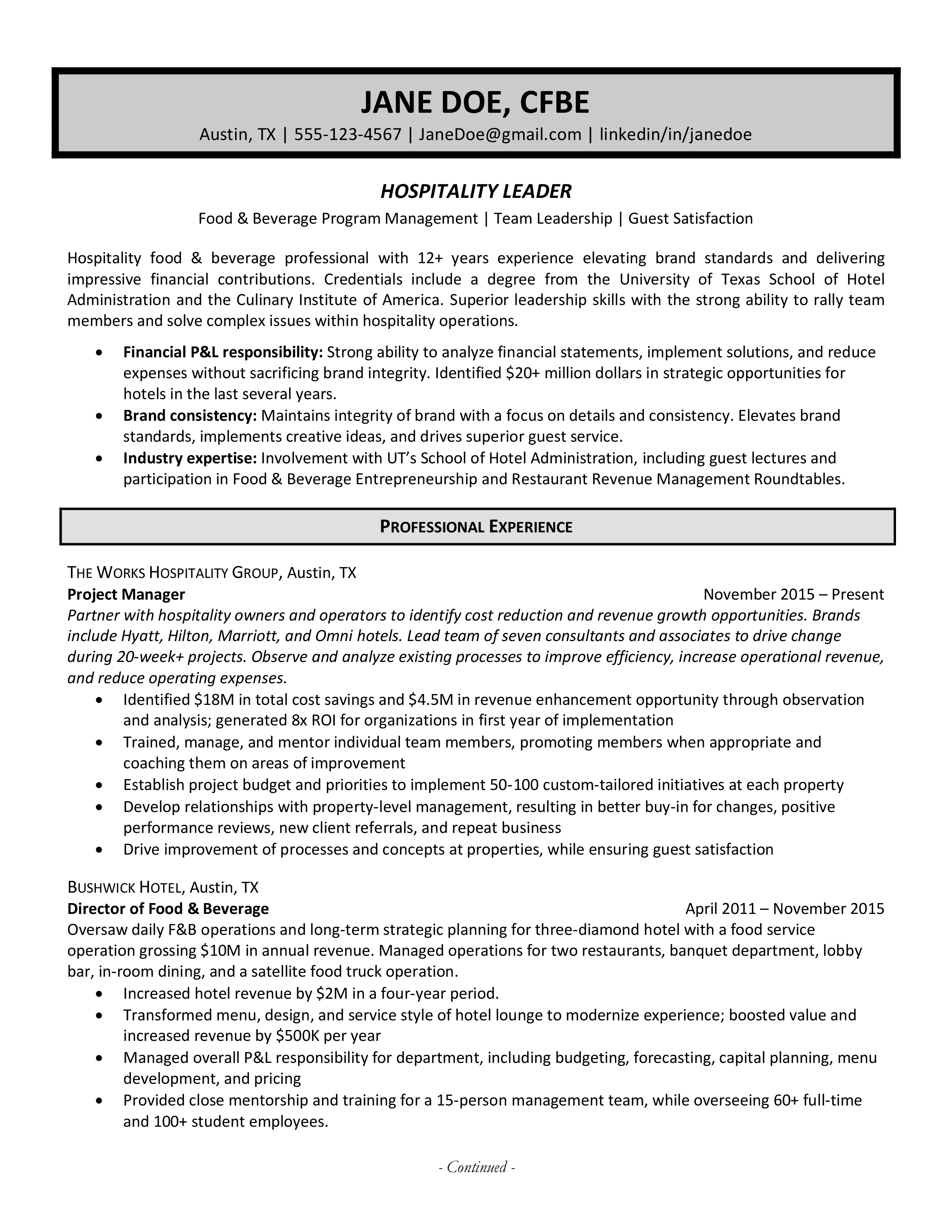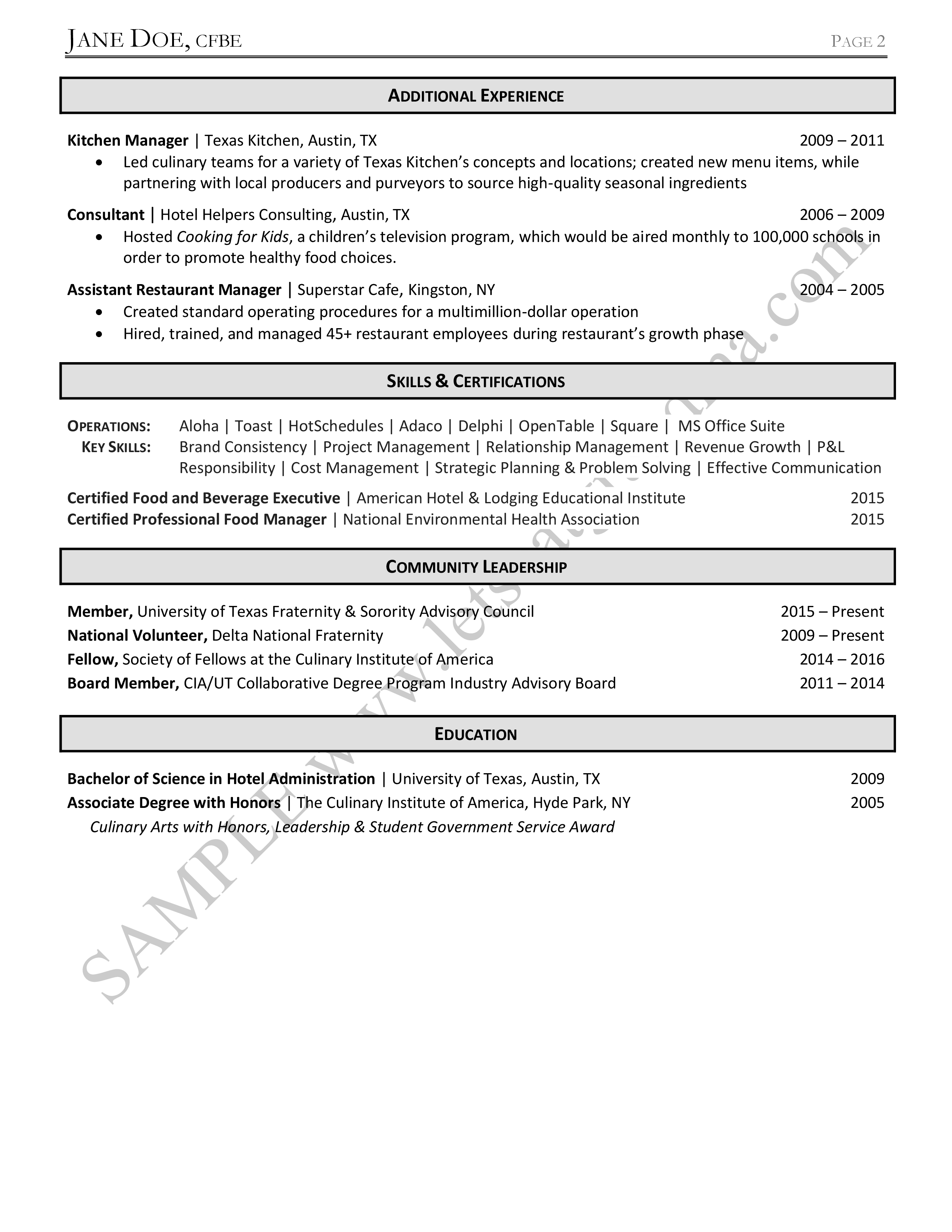Quit Your Hospitality Job? Here’s a Resume Example to Help

Use this hospitality resume example to continue your growth in the industry, or apply its principles to optimize your assets to support your transition away.
By: David Hartley | Contributor for Let’s Eat, Grandma
Welcome to 2022, job seeker, and all the new goals – and challenges – it brings.
While the holiday season was relaxing for most of us in the U.S., there was one particular group that didn’t get the opportunity to relax: the hospitality industry. Long hours, little pay, no holidays, and now the added risk of Covid-19 has made hospitality workers like you leave their jobs at double the rate of the national average (6.4% vs. 3% as of September 2021).
Tired of not landing interviews?
Get our free 3-step guide to writing better resume bullet points, featuring 70 ideas for metrics you can use!
The hospitality industry is often described as one of the most stressful industries to work in. In addition, it can often feel like an industry that is difficult to transition out of.
As a former bartender myself, I struggled to reinvent myself for different industries. What I didn’t know at the time is that the hospitality industry prepares you with a litany of soft skills that are important in other industries. Knowing how to display those skills on your resume is half the battle.
Whether you’ve quit your job to find another hospitality position or transition to another industry altogether, we’re an award-winning resume service, and we’re here to help.
Below is a hospitality resume example we wrote, followed by tips on how to apply our best practices to your own resume to get hired!


Option 1: Staying in the Industry

Bartenders develop lots of important soft skills, such as multitasking, problem solving, and customer service. Photo by ABDALLA M on Unsplash
What if you would like to stay in the hospitality industry, but move up or change your area of focus? Let’s take a closer look at the resume example above. This potential candidate worked in a few traditional roles within a restaurant including Kitchen Manager and Assistant Restaurant Manager. Those roles were then leveraged into roles in Project Management and Operations. Working in hospitality allows you to lead and train others, so ensuring that information is front and center for the reader will support your promotion into management or another higher step in your hospitality career.
But that’s not the only thing our Jane Doe did. Jane discovered moments in her career where she made an impact on the organizations she worked for that aligned with her future positions. She utilized metrics to quantify these accomplishments so that the reader has a better understanding of the work she did.
So how do you discover these metrics for your own career? Well, think of any accomplishments, improvements, or recommendations you made while working in the hospitality industry. Some key examples can include:
- How many people you take care of each day
- Any achievements in customer service surveys or guest satisfaction surveys filled out for you
- New improvements including menu items, service style, or efficiency increases
- Subject matter expertise and the vast food and beverage knowledge you had to possess to successfully work your job
Metrics can be intimidating to add to any resume, but just keep your focus ons what’s important to the reader and your industry. If you keep your focus on that, you’ll have a strong resume in no time!
(Struggling to come up with metrics? Our free eBook has 70 ideas to get you started!)
Option 2: Transitioning out of the Industry

Many of the skills you strengthen in the hospitality industry are transferable to other industries. Photo by ABDALLA M on Unsplash
If you’re hoping to transfer into a different industry, writing your resume involves a bit more innovative thinking when it comes to your past experiences. First, you’ll need to identify what you loved about the hospitality industry and how you can use that passion in a career that aligns with your soft skills.
For example, I was a bartender for over six years in Chicago. I didn’t love the industry, but what I did love was taking care of my guests. Those interactions with customers are what kept me in the industry for so long, but 2020 changed everything and made me reexamine my career. Thankfully, I found I could apply my passion and knack for taking care of people into a job as a resume writer!
While specific experiences I had with guests are unique to me, the work I did applies to much of the hospitality industry, and can transition to many other industries. Let’s think of some examples:
- Learned a large menu and told guests about your favorites? You were a subject matter expert and provided key recommendations.
- Used a tablet or a computer to enter orders? You utilized a point-of-sale system to ensure the timely delivery of services.
- Did you take care of regulars? You built and maintained key relationships with guests to create repeat customers.
I could go on and on, but I think you are starting to understand how to transform what you did day-to-day into “business speak.”
Which industry should I transition to?
Once you have analyzed your past work and decided which direction you would like to go in, you need to select an industry to apply for. Let’s look at some examples and talk about the soft skills that align with them:
Customer Service:

Customer service is a natural transition for many in the hospitality industry. Photo by Berkeley Communications on Unsplash
So, what skills apply? Well, quite simply, customer service. The hospitality industry is all about how you interact with strangers and make them happy – whether that’s through waiting tables, bartending, or working in a hotel. Highlight your skills in customer service by focusing your resume on the ways you solved your customers’ problems and kept them engaged and happy.
Marketing:
As almost an extension of Customer Service, Marketing can be an easy transition for those currently in the hospitality industry. The foundation of Marketing is creating experiences with interested prospects and customers to create brand loyalty and returning customers.
Highlighting your ability to create the best experience possible for customers in your current position shows that you can make the transition into marketing. Display your skills in customer engagement and guest experiences to fully optimize and align your resume to a marketing position.
Sales and Business Development:
Careers in Sales and Business Development need employees that hustle. For servers and bartenders, this ability to upsell and increase their check size is second nature.
If you’re a server or bartender looking to move to a Sales-like role, highlight the ways you upsell for a customer as a subject matter expert. While getting the guest to buy an $85 bottle of wine versus a $9 glass may not seem that impressive, it may be exactly what a sales manager is looking for out of their next employee.
Operations Manager:
While operations may seem like a reach for hospitality workers, let’s talk about some of the functions. The Operations field is all about optimizing processes, encouraging continuous improvement, and enhancing collaboration. While that may seem like high-level work compared to serving tables or working in a hotel, it aligns better than you think. Have you ever done anything like this in your restaurant:
- Train new servers in best practices and procedures?
- Modify the “old way” of doing things to be more efficient?
- Continuously communicate with fellow bartenders, servers, bussers, etc. to ensure a smooth service?
All these examples align with Operations. Be sure to highlight them if this is the direction you would like to go.
Recruiting:
As with most of the options we’ve talked about so far, the ability to build relationships with others is by far the most important skill you have learned when working in the hospitality industry. In recruiting, communicating with potential candidates to better understand their skills and abilities helps them land that next job.
Let’s think of an example. Have you ever had a picky guest that didn’t know what to drink or eat and you had to pry for key information to better understand them? As an agency recruiter, you’ll be doing the same, but rather than asking them what they typically drink at home, you’ll be getting key information about their technical skills and achievements in their careers.
Highlight the times when you had to be an interviewer with the guest and the results that came from your hard work. Showing that you can dissect information into key parts to get someone where they need to be will be essential with your new recruiting position.
How Should I Customize my Hospitality Resume?

Whether creating a resume to continue in the hospitality industry or transition out of it, it’s important to include keywords from the job description. Photo by Patrick Tomasso on Unsplash
As with any career transition, you want to make sure that you start by aligning keywords from the job description to your resume. You might have the most impressive work experience in restaurants, but if your resume doesn’t come up in the recruiter’s Applicant Tracking System (ATS) searches, you’ll never stand a chance.
Start by aligning your headline and your summary of qualifications with the job listing (you can even include the exact job title.) Adding in a targeted headline will help your resume twofold: it will add important keywords to help you come up in ATS searches and it shows the reader that you’ve customized the resume to the job listing. Let’s take a look at the resume example of our Jane Doe. She added the title of Hospitality Leader with some aligning keywords that tie her experience to her job target.
And finally, write a strong summary of qualifications that proves you are right for the job. You should customize this section for every job listing since different companies will be searching for different things. This section is your first impression on your resume, so be sure to call out your qualifications that are most important to the job posting.
Let’s take one final look at our Jane Doe’s resume. She added a strong summary that featured keywords that aligned including P&L, Brand Standards, and Restaurant Management. While adding the job title at the top is a good strategy for ATS, combining that with a strong summary is absolutely essential. Never forget to analyze the job listing before sending in that resume!
What Now?
Transitioning out of the hospitality industry was one of the most difficult things I’ve ever done, but it was the best decision for me and it may be for you as well. Remember to not give up! You could get a 1,000 no’s before you get that one yes.
Whether you’re moving on to a new location or new role altogether, utilizing some of the tips from this hospitality resume example will increase your chances of getting hired no matter your next move.
Ready for more job search help?
Sign up for a free Senior Writer Resume Critique to see what's holding you back from landing interviews. One of our top professional resume writers will give you personalized feedback on the top 3 items you can improve based on our expert practices!
